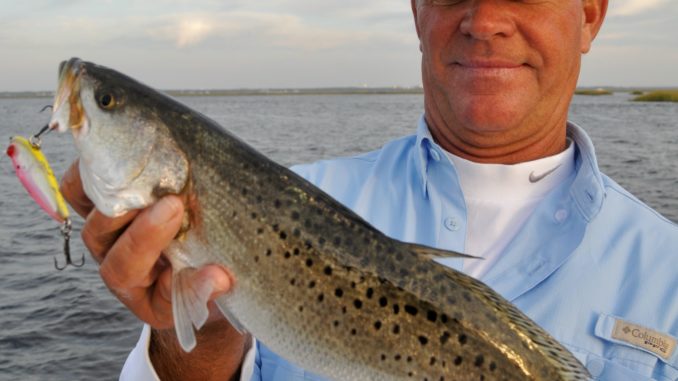
Committee to accept public input on North Carolina saltwater fisheries management.
North Carolina saltwater anglers soon will get to speak their minds about the future of saltwater resources management during the first of four public hearings.
“The (Legislative Research Commission’s) committee (on saltwater issues) will meet Nov. 1 in Raleigh and decide by Nov. 4 when, where and what time these meetings will be held,” said Ann Murtha, legislative aide to Rep. Darrell G. McCormick (R-Winston-Salem).
McCormick was one of the co-sponsors of the ill-fated “game-fish status” bill (House Bill 353) that would have prevented striped bass, spotted sea trout and red drum from being targeted for sale by anyone. The bill was held up by a budget deal between the Republican leadership and five Democrats, with the Democrats (or at least one of them) wanting HB 353 not brought before the legislature for a vote.
The deal gave the Republicans a majority to override Gov. Beverly Perdue’s later veto of the budget bill.
But the game-fish status bill wasn’t killed, but rather became a project of the Legislative Research Commission. The Commission appointed a 14-member committee that will examine many aspects of saltwater management, including such topics as merging the North Carolina Marine Fisheries Commission with the North Carolina Wildlife Resources Commission, re-structuring how and which people will be appointed to the N.C. Marine Fisheries Commission and studying the economic impact created by the recreational fishing business (licensing, travel, hotel/motel, food, tackle/bait, etc.) that has been estimated at 150 times greater than the commercial impact of netting reds, specks and stripers.
The study committee will hold the four hearings to obtain public input before making recommendations to the House and Senate during the 2012 May session of the legislature.
“One of the hearings will be in Raleigh at the legislature, probably at the Legislative Office Building,” a legislative source said.
Other meetings likely will be held at the North Carolina coast and at piedmont- and western-region venues.
The study committee has 14 members, including co-chairs McCormick and Senate Majority leader Harry Brown, plus senators Don East, Thom Goolsby, Bill Rabon, Tommy Tucker, Jean Preston and Stan White. House members include Representatives Dan Ingle, Ruth Samuelson, Danny McComas, Bryan Holloway, Pat McElraft and Tim Spear.
Ingle joined Samuelson as one of the co-sponsors of the game-fish status bill.
Spear was chairman of a 2010 committee that tabled a similar bill and did not allow it to come before the House for a vote.
This study was triggered by several wasteful incidents of trawl netting of ocean-run striped bass last February; the first such incident killed 3,000 to 4,000 striped bass, according to a DMF probe.
North Carolina red drum, although supposedly not targeted by commercial netters, also continue to be caught and sold. In November 2010, the N.C. Division of Marine Fisheries recommended the MFC adopt a year-round weekend closure (no possession) in the commercial spotted seatrout fishery, with all gear removed from the water on weekends from November through February (except for western Albemarle Sound and Currituck Sound). This recommendation was similar to the Spotted Seatrout Fishery Management Plan Advisory Committee’s plan. The MFC ultimately chose a commercial weekend possession closure that still allowed attended gear to remain in the water on the weekends
In February 2011 the DMF asked the MFC to continue a closure in the spotted seatrout fishery that the director had implemented by proclamation due to cold stun events. The MFC chose to include a 50-pound-per-day by-catch provision not recommended by the division.
Recreational fishing groups – represented by the Coastal Conservation Association of North Carolina, Coastal Fisheries Reform Group and North Carolina Camouflage Coalition – supported the 2010 and 2011 game-fish status bills, and for years have asked for more protection for saltwater resources from over-exploitation by a relatively small group of netters.
Committee members can be reached:
• Harry Brown, harry.brown@ncleg.net,
• Don East, don.east@ncleg.net,
• Thom Goolsby, thom.goolsby@ncleg.net,
• Bill Rabon, bill.rabon@ncleg.net,
• Tommy Tucker, tommy.tucker@ncleg.net,
• Jean Preston, jean.preston@ncleg.net,
• Stan White, stan.white@ncleg.net,
• Darrell McCormick, darrell.mccormick@ncleg.net,
• Dan Ingle, dan.ingle@ncleg.net,
• Ruth Samuelson, ruth.samuelson@ncleg.net,
• Danny McComas, danny.mccomas@ncleg.net,
• Bryan Holloway, bryan.holloway@ncleg.net,
• Pat McElraft, pat.mcelraft@ncleg.net,
• Tim Spear, tim.spear@ncleg.net.


Be the first to comment